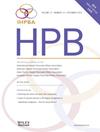The development of a person-centred self-report instrument to investigate quality-of-life aspects of gallstone surgery - The Gothenburg gallstone questionnaires (GGQ24pre & GGQ21post)
IF 2.4
3区 医学
Q2 GASTROENTEROLOGY & HEPATOLOGY
引用次数: 0
Abstract
Background
To develop and psychometrically test a condition-specific, patient-reported outcomes instrument for patients undergoing gallstone surgery.
Methods
A mixed-methods design, including six gender-mixed patient focus-groups was used. Statements were thematically analysed and compared to PROMIS and the Gastrointestinal Quality of Life Index (GIQLI). A pilot questionnaire of 63 items and the full scale GIQLI was sent to preoperative and 30 items were sent to postoperative patients. Factor analysis identified structure and redundant items. Short versions were assessed to ensure internal reliability and validity. Unidimensionality was assessed via graded response model.
Results
273 patients completed the questionnaires (preoperatively n = 104 and postoperatively n = 169). Factor and IRT analysis identified 13 domains with 45 questions. Internal reliability 0.75 to 0.93 in the preoperative and 0.73 to 0.90 in the postoperative questionnaire. A PROM questionnaire was developed with pre- and postoperative modules (24 questions, 8 domains and 21 questions, 5 domains).
Conclusion
This study has shown the validity of a disease specific Health Related Quality-of-Life (HRQoL) instrument in a population with gallstone disease and a post-operative module for follow-up. Further testing in a longitudinal cohort is recommended in order to establish responsiveness.
以人为中心的自我报告工具的发展,以调查胆结石手术的生活质量方面-哥德堡胆结石问卷(GGQ24pre & GGQ21post)。
背景:为接受胆结石手术的患者开发和心理测量学测试一种条件特异性的、患者报告的结果工具。方法:采用混合方法设计,包括6个性别混合的患者焦点组。对这些陈述进行主题分析,并与PROMIS和胃肠道生活质量指数(GIQLI)进行比较。术前发放63项试点问卷和全量表GIQLI,术后发放30项。因子分析确定了结构和冗余项。对短版本进行评估以确保内部信度和效度。通过分级反应模型评估单维性。结果:273例患者完成问卷调查(术前104例,术后169例)。因子和IRT分析确定了13个领域,45个问题。术前问卷内部信度为0.75 ~ 0.93,术后问卷内部信度为0.73 ~ 0.90。制定了一份PROM问卷,包括术前和术后模块(24题,8个领域和21题,5个领域)。结论:本研究显示了一种疾病特异性健康相关生活质量(HRQoL)仪器在胆结石患者群体中的有效性,并提供了一种术后随访模块。建议在纵向队列中进行进一步测试,以确定反应性。
本文章由计算机程序翻译,如有差异,请以英文原文为准。
求助全文
约1分钟内获得全文
求助全文
来源期刊

Hpb
GASTROENTEROLOGY & HEPATOLOGY-SURGERY
CiteScore
5.60
自引率
3.40%
发文量
244
审稿时长
57 days
期刊介绍:
HPB is an international forum for clinical, scientific and educational communication.
Twelve issues a year bring the reader leading articles, expert reviews, original articles, images, editorials, and reader correspondence encompassing all aspects of benign and malignant hepatobiliary disease and its management. HPB features relevant aspects of clinical and translational research and practice.
Specific areas of interest include HPB diseases encountered globally by clinical practitioners in this specialist field of gastrointestinal surgery. The journal addresses the challenges faced in the management of cancer involving the liver, biliary system and pancreas. While surgical oncology represents a large part of HPB practice, submission of manuscripts relating to liver and pancreas transplantation, the treatment of benign conditions such as acute and chronic pancreatitis, and those relating to hepatobiliary infection and inflammation are also welcomed. There will be a focus on developing a multidisciplinary approach to diagnosis and treatment with endoscopic and laparoscopic approaches, radiological interventions and surgical techniques being strongly represented. HPB welcomes submission of manuscripts in all these areas and in scientific focused research that has clear clinical relevance to HPB surgical practice.
HPB aims to help its readers - surgeons, physicians, radiologists and basic scientists - to develop their knowledge and practice. HPB will be of interest to specialists involved in the management of hepatobiliary and pancreatic disease however will also inform those working in related fields.
Abstracted and Indexed in:
MEDLINE®
EMBASE
PubMed
Science Citation Index Expanded
Academic Search (EBSCO)
HPB is owned by the International Hepato-Pancreato-Biliary Association (IHPBA) and is also the official Journal of the American Hepato-Pancreato-Biliary Association (AHPBA), the Asian-Pacific Hepato Pancreatic Biliary Association (A-PHPBA) and the European-African Hepato-Pancreatic Biliary Association (E-AHPBA).
 求助内容:
求助内容: 应助结果提醒方式:
应助结果提醒方式:


